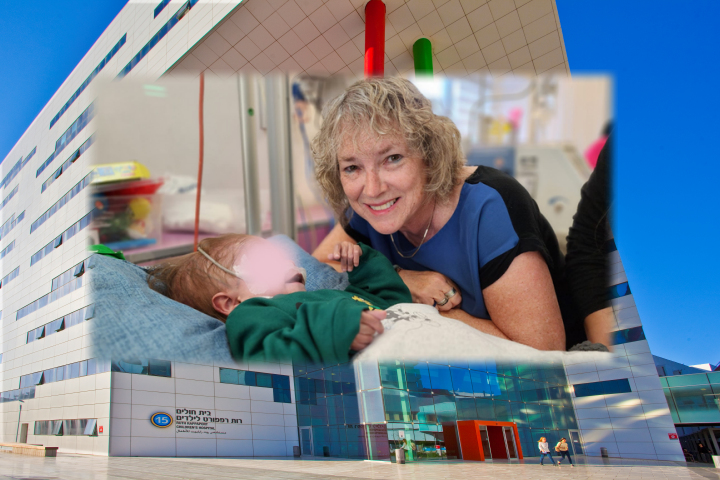Every year, Rambam Health Care Campus (Rambam) in Haifa, Israel, treats more than 20 abandoned babies—those who are hospitalized for long periods of time with no relative to care for them, in the neonatal, intensive care, oncology and other hospital wards.
 Debbie Block-Temin with one of the babies she regularly hugs. Ruth Rappaport Children's Hospital in the background. Photography: Rambam HCC.
Debbie Block-Temin with one of the babies she regularly hugs. Ruth Rappaport Children's Hospital in the background. Photography: Rambam HCC.
The abandoned babies suffer from severe diseases, birth defects, or injuries. Many have already undergone multiple surgeries in their brief lives, and they are often sedated and connected to mechanical ventilators to help them breathe.
In the absence of any family, these babies are often accompanied by volunteers from the Chibbuk Rishon or “First Hug” Association, which operates in 17 hospitals around the country. In the past year, volunteers cared for 217 abandoned babies, 24 of them at Rambam.
Dania Miara Lederer from Haifa, volunteers at Rambam. She described the first baby she ever hugged: “R” was a little girl who couldn’t see, hear or even eat, because of a cleft palate. I would pat and caress her for hours on end. Sometimes I would sing to her, but then I remembered that she could not hear. The touch of my hand was the only communication she had with the outside world.”
One day, as Dania arrived on duty, she saw that R had undergone emergency surgery, and was sedated and ventilated in the Wagner Green Pediatric Intensive Care Unit in the Ruth Rappaport Children’s Hospital at Rambam. After receiving permission from the medical team, Dania put her hands on R’s tiny body. What happened in those seconds astounded the entire team. All the infant’s vital signs stabilized, her pulse slowed and blood pressure dropped, and her breathing became more regular. The head of the department disconnected the little girl from the anesthesia machine and breathing tube and placed her in Dania’s arms. Dania said: “The two of us sat there for three sweet hours in which her tiny body responded to my hugs and caresses. These hours will be forever etched in my memory – they showed the power of touch.”
Danielle Farhi, a resident of Kiryat Ata, has been volunteering with the Association for four years. Farhi explained that not only the babies, but the volunteers benefit profoundly from their interactions with the fragile infants: “It’s amazing how the crazy pace of life stops, and all thoughts are focused on only one thing – three hours of hugs, caresses, songs and conversations for an abandoned baby. Slowly the breaths synchronize and I begin to wonder what you will remember. You may not know, but while I hugged you, you hugged me back. You gave me perspective, and thrilled me when you were more of a hero than I was during the tests they performed on you. So thank you for the privilege of giving you the first hug.”
Another Rambam volunteer, Debbie Block-Temin, shares: “We took care of a sweet baby girl whose parents were unable to be at her bedside. She was born prematurely and had many health-related complications. Feeding was difficult for her, but a team of “First Hug” volunteers learned to feed her little by little. We often found her crying in bed, but as soon as we picked her up and hugged her, she would immediately calm down.”
Efrat Yassour, CEO of the “First Hug” Association explains that volunteers are carefully screened and must undergo extensive training. The Association is currently training dozens of volunteers who will work at Rambam. By expanding the number of volunteers, Yassour said: “We will be able to provide more and more hours of hugs to each individual baby.”
From a story first published in Hebrew on MyNet.

